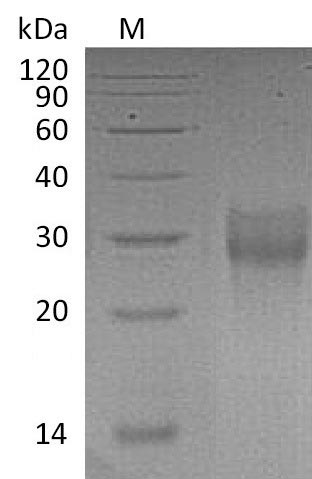CD137 (human):Fc (human) (rec.)
CHI-HF-210CD137
Product group Proteins / Signaling Molecules
Overview
- SupplierChimerigen Laboratories
- Product NameCD137 (human):Fc (human) (rec.)
- Delivery Days Customer2
- CertificationResearch Use Only
- Estimated Purity>98%
- Scientific DescriptionHuman CD137 (4-1BB) is a costimulatory molecule of the tumor necrosis factor (TNF) receptor superfamily. The glycoprotein 4-1BB is expressed mainly on activated CD4+ and CD8+ T cells and binds to a high-affinity ligand (4-1BBL) expressed on several antigen-presenting cells such as macrophages and activated B cells. Upon ligand binding, 4-1BB is associated with the tumor receptor-associated factors (TRAF), the adaptor protein and mediates downstream signaling events including the activation of NF-kappaB and cytokine production. 4-1BB signaling either by binding to 4-1BBL or by antibody ligation delivers signals for T cell activation and growth as well as monocyte proliferation and B cell survival, and plays a important role in the amplification of T cell-mediated immune responses. In contrast, it can also enhance activation-induced T cell apoptosis when triggered by engagement of the TCR/CD3 complex. In addition, the 4-1BB/4-1BBL costimulatory pathway has been shown to augment secondary CTL responses to several viruses and increase antitumor immunity. 4-1BB is therefore a promising candidate for immunotherapy of human cancer. - Protein. The extracellular domain of human CD137 [4-1BB] (aa 19-184) is fused to the N-terminus of the Fc region of human IgG1. Source: CHO cells. Endotoxin content: 98% (SDS-PAGE). Human CD137 (4-1BB) is a costimulatory molecule of the tumor necrosis factor (TNF) receptor superfamily. The glycoprotein 4-1BB is expressed mainly on activated CD4+ and CD8+ T cells and binds to a high-affinity ligand (4-1BBL) expressed on several antigen-presenting cells such as macrophages and activated B cells. Upon ligand binding, 4-1BB is associated with the tumor receptor-associated factors (TRAF), the adaptor protein and mediates downstream signaling events including the activation of NF-kappaB and cytokine production. 4-1BB signaling either by binding to 4-1BBL or by antibody ligation delivers signals for T cell activation and growth as well as monocyte proliferation and B cell survival, and plays a important role in the amplification of T cell-mediated immune responses. In contrast, it can also enhance activation-induced T cell apoptosis when triggered by engagement of the TCR/CD3 complex. In addition, the 4-1BB/4-1BBL costimulatory pathway has been shown to augment secondary CTL responses to several viruses and increase antitumor immunity. 4-1BB is therefore a promising candidate for immunotherapy of human cancer.
- Storage Instruction-20°C,2°C to 8°C
- UNSPSC41116100
- SpeciesHuman


